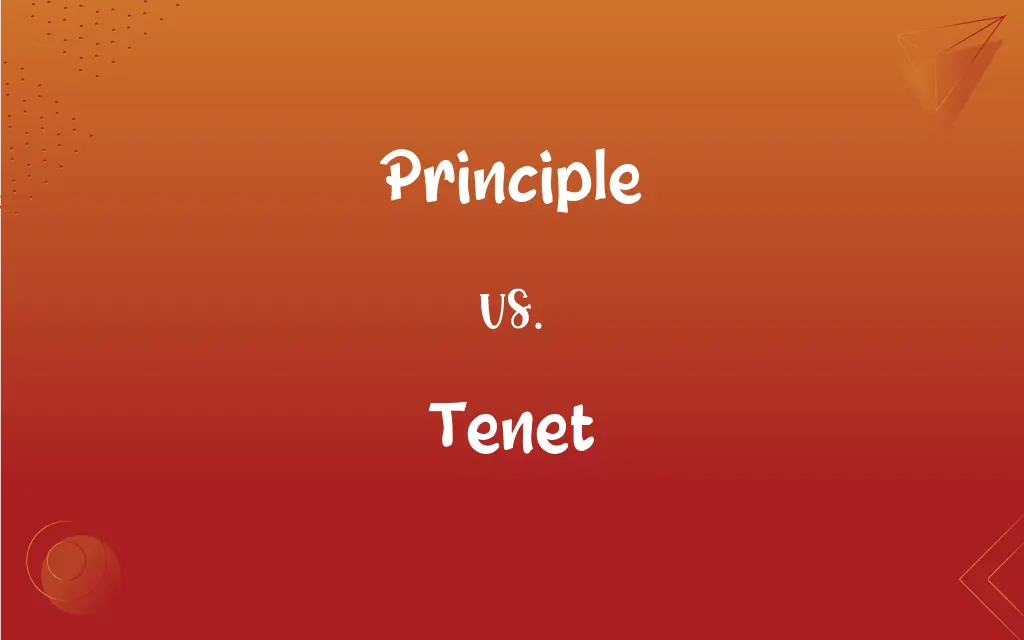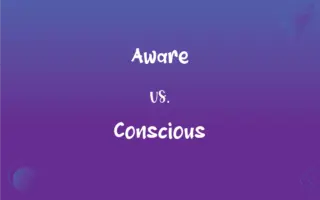Principle vs. Tenet: What's the Difference?
Edited by Janet White || By Harlon Moss || Updated on November 6, 2023
A principle is a fundamental truth or proposition serving as the foundation for belief or action, while a tenet is a belief or doctrine generally held to be true within a group.

Key Differences
A principle is a foundational belief that influences one's actions, often considered moral or ethical in nature. It is a broad concept that can apply to personal codes of conduct or general laws of nature. Principles are used to guide decisions and form the basis for consistent behavior across various situations.
A tenet, on the other hand, is specifically a principle or belief that is a part of a larger system of beliefs, often associated with religious, philosophical, or political systems. Tenets are the building blocks of a belief structure within a particular organization or group and are usually accepted by members of that group as truth.
Principles can exist independently and are often universal; they are not confined to any one group or ideology. For instance, the principle of gravity is not specific to any one scientific school of thought. Likewise, the principle of honesty is upheld in many different cultures and communities.
Tenets are less likely to stand alone and are often discussed in context with other tenets. For example, one of the tenets of Buddhism is the belief in karma, which is interwoven with other tenets of the religion. Similarly, a tenet of democracy might be the right to free speech, which is supported by other democratic tenets.
In summary, while both principles and tenets can guide actions and beliefs, principles are broader and can be universally accepted, whereas tenets are specific to certain groups or belief systems and are collectively upheld within those systems.
ADVERTISEMENT
Comparison Chart
Definition
A fundamental truth or law as the basis of reasoning or action.
A belief or doctrine considered to be true by a group.
Universality
Can be universally recognized or applied.
Generally specific to a particular group or system.
Context
Personal or general, can be independent of organizations.
Often associated with a specific ideology or religion.
Scope
Broad and foundational.
More narrow, a component of a belief system.
Flexibility
Can be a personal choice and subject to interpretation.
Usually fixed within its system and not open to personal interpretation.
ADVERTISEMENT
Principle and Tenet Definitions
Principle
Rule or standard.
He made his decision based on the principle of fairness.
Tenet
Opinion, belief, or doctrine held to be true.
It's a widely held tenet that education is key to success.
Principle
Scientific law.
The principle of gravity explains why objects fall to the ground.
Tenet
Principle or belief, especially one of the main principles of a religion or philosophy.
The tenet of non-violence is critical to many faiths.
Principle
Fundamental truth.
The principle of equal rights for all is central to democracy.
Tenet
Belief or doctrine.
A central tenet of Buddhism is the concept of impermanence.
Principle
Guiding sense of the requirements and obligations of right conduct.
She wouldn't lie; it was against her principles.
Tenet
A position or principle on a particular issue that is endorsed by a particular group.
One tenet of environmentalists is the importance of conserving natural habitats.
Principle
Basic theory or truth that has a wide application.
The principles of economics dictate market behavior.
Tenet
Any opinion or doctrine that a person holds or maintains as true.
As a doctor, she adheres to the tenet 'do no harm.'
Principle
A basic truth, law, or assumption
The principles of democracy.
Tenet
A doctrine, principle, or position held as part of a philosophy, religion, or field of endeavor.
Principle
A rule or standard, especially of good behavior
A man of principle.
Tenet
An opinion, belief, or principle that is held as absolute truth by someone or especially an organization.
FAQs
Can a tenet be part of a non-religious organization?
Yes, political parties and other groups have tenets too.
Are tenets always strictly followed?
Within certain groups, tenets are expected to be followed, but adherence can vary.
Do principles change over time?
Some do, as they can be subject to societal evolution and personal interpretation.
Are principles always moral guidelines?
Often, but they can also be fundamental truths in other areas like science.
Can someone have their own personal tenets?
Typically, tenets are shared beliefs within a group, but individuals can have strongly held personal beliefs akin to tenets.
Are ethical principles universal?
Some ethical principles are widely accepted, though not universally.
Is a principle always true?
Principles are generally held to be true, but they can be disproven in scientific contexts.
Are principles abstract concepts?
They can be abstract or concrete, depending on the context.
Are all tenets religious or spiritual?
No, some tenets are secular, such as those in politics or philosophy.
Can a principle be proven wrong?
In scientific contexts, yes, principles can be disproven or revised.
Can principles form the basis of laws?
Yes, many laws are based on societal principles.
Can someone have multiple principles?
Yes, individuals often live by multiple principles.
Can a tenet be questioned within its group?
This depends on the group, but questioning tenets can sometimes lead to changes or reforms.
Do all religions have the same tenets?
No, different religions have different sets of tenets.
Is a tenet legally binding?
Not usually, unless it coincides with a law.
Are tenets debatable?
Within academic or intellectual contexts, they can be.
Is it possible for a tenet to become a principle?
If it gains widespread acceptance beyond its original group, it could be considered so.
Do tenets have to be written down?
They often are, but some can be understood implicitly within a culture or group.
How are principles developed?
Through cultural, ethical, or scientific understanding and consensus.
Can a principle lead to the formation of tenets?
Yes, principles can give rise to specific tenets in belief systems.
About Author
Written by
Harlon MossHarlon is a seasoned quality moderator and accomplished content writer for Difference Wiki. An alumnus of the prestigious University of California, he earned his degree in Computer Science. Leveraging his academic background, Harlon brings a meticulous and informed perspective to his work, ensuring content accuracy and excellence.
Edited by
Janet WhiteJanet White has been an esteemed writer and blogger for Difference Wiki. Holding a Master's degree in Science and Medical Journalism from the prestigious Boston University, she has consistently demonstrated her expertise and passion for her field. When she's not immersed in her work, Janet relishes her time exercising, delving into a good book, and cherishing moments with friends and family.































































